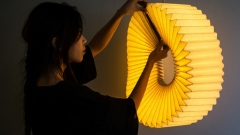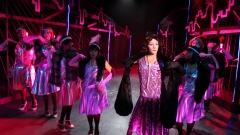
Underground Pool: Between and Beyond the Space of Us
By Paul Winter '12 (Painting/Drawing)
Trevor walked up the stairs out of syncopation with the snoring of his father, who lay asleep in the chair downstairs. The space between them was an air filled with the distinct smell of cheap deodorizer, and while nobody would have ever heard it, these two essences—the sound of snores and an anti-smell smell—were punctured by a rush of sound produced by the grinding of Trevor’s cotton-nylon socks against the millions of tiny synthetic filaments in the carpet on the stairs. Each gap between his toes and the filaments was filled with a crunch, like the twisting of a large forest by a hurricane.
Trevor’s destination was the bathroom on the second floor of his family’s home, which was occupied by Brian, his brother, who was showering, yet the door was unlocked and the immense amount of steam pressed its way through the infinitesimal cracks of the door frame, which indicated an invisible osmosis of cool and warm air. You can imagine what opening the door must have been like, and how little could be seen of the bathroom interior. At some point while brushing his teeth, Trevor’s reflection in the bathroom mirror could be seen gazing aimlessly past its corporeal self and toward the textured glass shower pane. Within the pane was a diffused and repeated image of his naked brother. At a moment not long after this, though neither was aware of it, the gazes of nearly one thousand Brians met the gaze of Trevor’s reflection. If so inclined, you could say that for a few seconds a thousand and one ghosts converged in an otherworldly steam, until a seductive and significantly colder air from another space lured the steam out of its ghost-nurturing existence and into a mediocre yet temperate atmosphere that trembled with the snores of Trevor’s father.
Now, though, the suspension of the boy’s images in solid substances moved in fluid harmony. This sort of dance could not have been planned by the best of choreographers, because it was so mundane and ordinary. Despite this, every droplet of condensation felt so moved by the two entities that it could not help but mimic them upon a glassy surface. Trevor spit a mix of saliva and blue-green fluoride into the rush of faucet water. He turned the faucet off and walked toward the door. Once he reached the threshold, the muscles of the two boys slightly relaxed. Brian slowed his movements; Trevor let his weight sink more heavily into his feet.
Trevor emerged from the bathroom after an elapsed time of roughly two minutes. His mouth open, he paused for a moment before going anywhere else. The scent of fresh mint hovered just below his nose but nowhere else in the house. A few granules of micro-abrasives lingered in the tiny fissures of his enamel, escaping the endless flow of slightly acidic saliva, which would rush them into his stomach. He moved toward his room, breaking the stillness of those glittering granules and abandoning the faint perfume of mint. The distance between Trevor and Brian increased as the sweetness of the perfume dissipated and was replaced by a sound—a loud, resonant snore.
Just prior to Trevor’s entry into his room, several deep and truly black shadows found their repose beneath his bed, behind his dresser, and elsewhere in hidden crevices and corners. But with a quick upward gesture from a finger of Trevor’s hand, the shadows scattered and retreated to places unknown to you and me. In their place emerged arrangements equally unfamiliar to Trevor, the backs and undersides of his furniture, which had stood in a strange sort of limbo between deep shadow and semi-shadow for two decades. Each façade collected dust, and a few million particles about the room found a brief moment of freedom when the deepest pitch of Trevor’s father’s snore shook them into the air. They would settle in the carpet filaments for several more years.
During this brief and sudden squall of unseen dust, Trevor locked his door and fell asleep upon his bed. The electric light above him hummed with little else to do until, four minutes later, it burned out and never sang again.
Outside, night had already fallen and reached its blackest. It was not a dreary night, but enough clouds had accumulated to obscure the moon and turn the world into shadow. Even the brightest white object, such as the rain gutter outside Trevor’s window, was diminished. Unbeknownst to any human, a dead crow lay in this gutter. No account can be retrieved for the life of this crow, for until its final landing it had dodged contact with any human. On this night, the black feathers of the bird had allowed it to escape the vision of any sentient being, to escape the label of an omen, to escape any definition whatsoever. To call it a crow is scarcely to be believed.
If you happened to be standing inside the house, particularly in Trevor’s room and at his window, a shadow would have crossed your vision just on the other side. It would have been detached from any surface. With this unique freedom, the shadow would have meandered through space and come to rest beside a maple tree. The next day, when the shadow became a feather again, Trevor’s mother, Barb, would come across it but find no sort of blackbird or crow or raven in the tree. Despite her ability to see all that the sun penetrated with its light, she would not see then this particular crow, but would see that Trevor had withdrawn his curtain, obscuring the view of his room, and shake her head.
But on this night and within this gutter the entire body of the crow was poised—its beak opened towards the sky, and nothing but the silent black passing between the V-like shape. The sky awaited its caw, and the dead crow delivered. Let us imagine what a dead crow caw must have sounded like here:
Nothing, of course, could be heard of the crow over the disjointed sounds of Trevor’s mother rearranging dishware, cookware, silverware, and dinnerware in the kitchen. The kitchen walls reflected and distorted (ever so slightly) the agitated clinks beneath the hum of a bulb similar to the one that had just burned out in Trevor’s room above the silent dust and shadow. His room was directly above the kitchen. The clinks and other bits of sound seemed to dart quickly through his room, through the air and through the ceiling. The sounds were loud enough to make Brian lucidly dream of playing slot machines. The boys’ father simply snored.
Between Trevor and his mother was a mouse, and with every sharp ting, click, clink, or rattle it darted from one unoccupied zone to the next. And with every dart several fleas darted across its soft gray fur, made black again by the shadows, then light again by a certain hole, then black again, and so forth. On this night, when there was a pause in the kitchen commotion, the fleas sunk their mandibles into the skin of the mouse. The mouse scratched, the fleas darted, Barb sighed, the mouse looked, the fleas looked, Barb closed her eyes, the father snored, Trevor rolled, the dust settled, the crow lost another feather, Brian coughed, the mouse darted, the fleas darted, the light bulbs hummed, the shadows darted, the light remained, Barb sucks her teeth—
Barb drops the cow mug. For a moment, nothing happens, nothing registers, the snoring stops, and the mouse freezes.
The cow mug, or ceramic cow pieces, lay fractured and act as a facture on the black-and-white tile floor beneath Trevor, the mouse, and Barb. Barb sees this and thinks to get the dustpan and brush. The mouse sees this and doesn’t think anything, but twitches its whiskers a little. The snoring resumes its regularity. The sound of the shattering mug makes Brian dream of winning the jackpot. In his dream he shouts and cries, but in reality he mumbles. Trevor and his father are in places in their dreams that are devoid of any cow mugs. You read this and think of a cow mug. I write this and am imagining you thinking of a cow mug. And so on.
What is interesting is not the events that will follow—that Barb will dispose of the broken pieces, or that the mouse will continue scampering about, itching its flea-bitten skin, or that Trevor’s father, who had a notorious affinity for his cow mug (often, the boys were reprimanded for using it), will spend the next day in a sour mood and drinking coffee from an old, faded, and unbefitting Dallas Cowboys mug. Instead, the interesting thing is what happens to the space once defined by the cow mug. At one time, the space was much like a cylinder, and its top suggested both an entry and an exit for various fluids imported from spaces outside the house. Like many of the objects in Trevor’s house, it spent most of its time not moving, yet occasionally would be shifted hastily from one space to the next, leaving behind a brief melodic riff as it collided with glass cups, punctuated by a sudden thud as its bottom brought the wood of the kitchen table to life.
Yet as it hits the tile floor of the kitchen, the cylindrical space mushrooms, collapses, and spreads itself over a span of many fragmented mosaic pieces. Each piece has its own curvilinear surface, suggesting that the cylinder has transformed into undulating planes extending from the edge of each shard, creating the kind of surface you would expect to see in a desert. Barb shifts her feet through this desert and sweeps up imaginary grains of sand and ceramic chunks which, in their fourteen years of life as a solid piece, served to hold a cumulative amount of coffee that was somewhere over five thousand gallons.
Those pieces will travel through many more stages before coming to rest in a dump far away from the house, from where they were manufactured, and from the ground from which their materials were gathered. Yet on their travels they will carry their infinitely stretching curved planes, which will intersect with similar beautiful planes from a plethora of open objects—exhaust from a motorcycle, trash cans, streetlights, broken glass, beams of light, shadows, and so on—before coming to rest in a massive heap of forgotten things, which is a pile that stretches so high and is so vast that one cannot distinguish one thing from another.
The final scene will not be romantic; it will stink and be infested with bacteria, rodents, and birds. The noise of the garbage trucks will outdo all other sounds, and the smell of rotting food, fungus, mold, and refuse will overwhelm any lingering perfume. Yet many objects will come to know one another. Some, under the immense compressing power of trash compactors, will fuse with others and become something new, forever hidden within the compost pile. Some will live beneath the sea, some beneath the ground. I cannot tell you where the cow mug will find its place in the world or how long it will stay there, but the microcrystalline layers of fired clay, coated with translucent and pigmented glass, will now contain within their defined space an assortment of things that were never placed inside a coffee mug before. In the meantime, the glasses within the kitchen are as silent as the crow, and the pace of the house is set to the dance of everyday movements, the sighing of Barb, the distanced and slumbering brothers, and the snoring of Trevor’s father.





